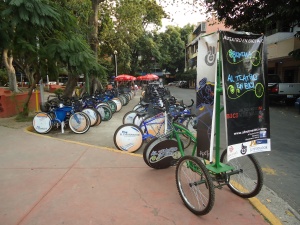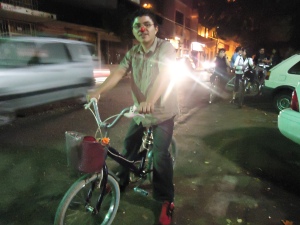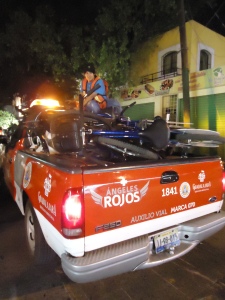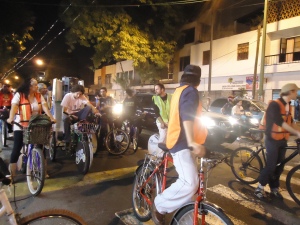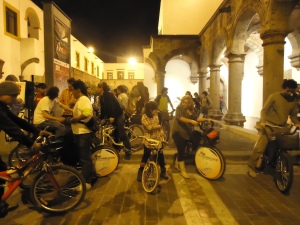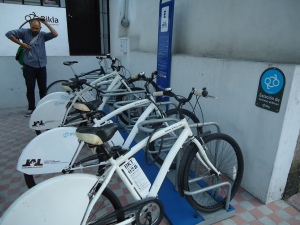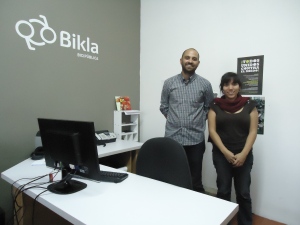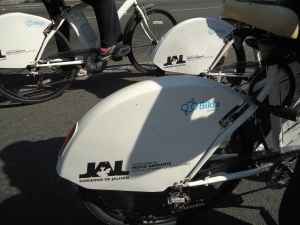Guadalajara, Jalisco, Mexico – Guadalajara is building momentum on their bicycle mobility movement. They have many rides that occur weekly attracting a wide range of people. These social bike rides have been occurring for less than a year and a half, but regularly attract hundreds or thousands of participants. Guadalajara’s sister city, Portland, Oregon claims title to “bike fun,” but Guadalajara is using social bike rides for a different purpose, to build a “social movement for urban mobility, culture, and public spaces.”
Al Teatro en Bici is one group of cyclists that hosts two different cultural bike rides every week. Their Tuesday rides pedal throughout the city to watch theatre and their Thursday rides, called “Bicinema,” head off to enjoy artistic cinema. When we attended both the Tuesday and Thursday bicycle rides they rivaled any bike fun rides held in Portland. The riders were extremely diverse in age, gender, and style, from elementary school students to grandparents. There was a very festive atmosphere, but no apparent drinking before the ride. It was a welcoming environment for everyone. The rides are well organized, with ride leaders of many different ages wearing reflective vests and keeping riders in the right lane, ‘a la derecha, por favor.’
The Tuesday we attended Al Teatro en Bici, it was a tribute to a recently deceased member of the cycling activist community, Chino Cappuccino, a bike clown. Many of the participants and organizers wore clown noses in tribute. Instead of the usual destination of an outdoor plaza or theater, this night had a very different destination. The 5km route was a circuitous loop that climaxed at the funeral home where all the pedalers applauded respectfully for their deceased friend and his mourning family.
This ride was also special because the city had just removed 15 automobile parking spaces and replaced them with Guadalara’s first on street bike parking. The bike parking to be used for 200 free bikes provided by the local newspaper, El Informador, as a bike sharing program administered by Al Teatro en Bici. These 200 free bikes are available to Teatro en Bici members. These bikes are single speed cruisers with Informador advertising and are available in exchange for a photo ID to anyone who has paid their $6 USD annual Al Teatro en Bici dues. This arrangement composes one of Guadalajara’s three different bike share systems. These loaner bikes also allow for many non bikers to join the ride. The Tuesday evening ride had over 700 participants and all of the 200 bikes were being used. These loaner bikes dramatically increased the diversity and demographics of the participants. These bikes were being used by young kids, the elderly, and many others wobbling down the streets. The loaner bikes and the huge group ride created an opportunity for inexperienced cyclists to enjoy the bustling city safely.
Another way that Al Teatro en Bici encourages diversity of cyclist skill levels is by having at least one mobile mechanic on bicycle accompanying each ride and a Red Cross pace car – truck on each of the rides. My first reaction to the bright red truck with flashing yellow lights was disgust at a truck tagging along, because we are on a BIKE ride. Though, as the ride progressed I saw that the young kids or the elderly who got tired would have their bikes put in the back of the truck and get a ride back to the park. This truck provided medical support and picked up broken bikes. The truck also helped mitigate confrontation with aggressive drivers and allowed a sense of authority to the bike ride. None of the other ride participants shared my concerns of having a car with us, so I got off my figurative tall bike.
Throughout the route we were cheered on by pedestrians and motorists excited by the cycling procession. The organizers in reflective vests and the Red Cross truck in the rear made it so there was no frustrated automobiles. After a pleasant pedal and remembrance for the departed bike clown, we all returned to the Park of Independence, and people checked back in the loaner bikes. We were also serenaded by two different concerts before and after the ride that were staged in the middle of the new bike parking. Al Teatro en Bici has a theme song that kicks off and ends each of their rides, where everyone that knows the lyrics sings along with the booming stereo trike, ‘We are pedaling off to the theatre, come and join us on our adventure.’
The crowd thinned quickly, being a Tuesday night, and only 150 or so people stayed to enjoy the concert and party. I took the opportunity to pepper the organizers and attendees with questions about the history and purpose of Al Teatro en Bici. Everyone was very excited to share their experiences with this Gringo from Portand. They all told me how their cycling activism was not political in any way, that it was purely a “social movement for urban mobility, culture, and public spaces.” Everyone I talked to told me that this was their common purpose. It seemed so much more mature than bike rides that I have participated in elsewhere. They refused to identify with the left or right politically as a movement. For these activists, the Al Teatro en Bici was an opportunity to re-envision mobility and promote culture in Guadalajara.
One of the Al Teatro en Bici activists, Jose Manuel Castañeda, repeated to me of how their rides are a part of their “movement for public spaces, urban mobility, and to promote arts, culture, recreation, and health.” Their rides started small with one a month, less than a year and a half ago and have grown dramatically. The city government, Red Cross, local newspaper, TV, and radio stations have begun sponsoring these events as a way to support culture and market to cyclists.” The police will help the large rides by blocking traffic, because “their job is to keep everyone safe.” The Al Teatro crew still holds their original 1st Thursday of the month ride, which regularly attracts 6 to 7 thousand cyclists. He told us how, “Many people show up for the fun of the ride and to be social, but as the movement progresses, people are realizing an alternative for mobility.”
Alfonso Leguer, another cyclist that became a good friend, told us that we were witnessing a generational shift in Guadalajara. The state government of Jalisco continues to push through automobile projects, like double decking freeways. “They promote these ideas with flashy TV advertisements with smiling faces and fast moving cars” Recently, the city of Guadalajara and activists have responded. There are now counter advertisements declaring a need for a new approach to mobility. Alfonso told us that about one that can be seen on Youtube, informing viewers that if ‘we were to line up all the cars in Guadalajara bumper to bumper, they would stretch all the way to Santiago, Chile. We need a new approach to mobility.’
Al Teatro en Bici activism is continuing to innovate, by bringing their rides out into the rural areas of the state of Jalisco by launching a new set of rides. These rides, called Bicientenario, are a play on words in honor of Mexico’s 200th birthday. These monthly rides are arranged to bring culture and cycling to the rural areas surrounding Guadalajara., using a truck and a bus to take participants out to a rural village, where they lead a ride throughout the town and then settle in to watch theatre or projected films.
Al Teatro en Bici is not the only group hosting weekly rides. Two other different activist groups, GDL en Bici & Paseo Ciclista Nocturno, hold their own nighttime car free streets events every week, called “Via Recreativa en la Noche.” These events regularly attract 5,000+ participants, according to Rodriguez Alemán Oscar, the director of the City Guadalajara’s car free Sunday, Via Recreativa. The activists use 40 volunteers with reflective vests to close the streets surrounding Avenida Chapultepec. Sr. Oscar told us that originally there would be conflicts with car drivers, as the groups would just go and block the streets. The local police and fire department would see these events and realize that these activists and crowds needed help and protection. Now, the city assigns one police car and a fire truck to these events each week to keep everyone safe. He told us that the police and fire marshals are not paid extra for this assignment, tbut hat helping the activists is part of “their duty to keep the city safe.” We asked Sr. Oscar about the permitting requirements for these activists closing a main arterial in the city. He told us, “they do not get permits, it is informal. It is not illegal, because they are all vehicles. These bike rides are to generate social consciousness about cyclist visibility.”
For additional information check out the Al Teatro website or emailalbertoellr@altetroenbici.com
Like them on Facebook under Al Teatro en Bici, Follow them on Twitter @alteatroenbici
youtube video regarding mobility in Guadalajara:
This story was written by Ryan Hashagen & translated and edited by Lale Santelices.
We are currently travelling overland and sea from Portland, Oregon to Puerto Montt, Chile investigating Latin American cycling culture.
Follow our super wonky transportation travels on:
Facebook: Globe Greenways
Twitter: @GlobalGreenways
Flickr: http://www.flickr.com/globalgreenways

